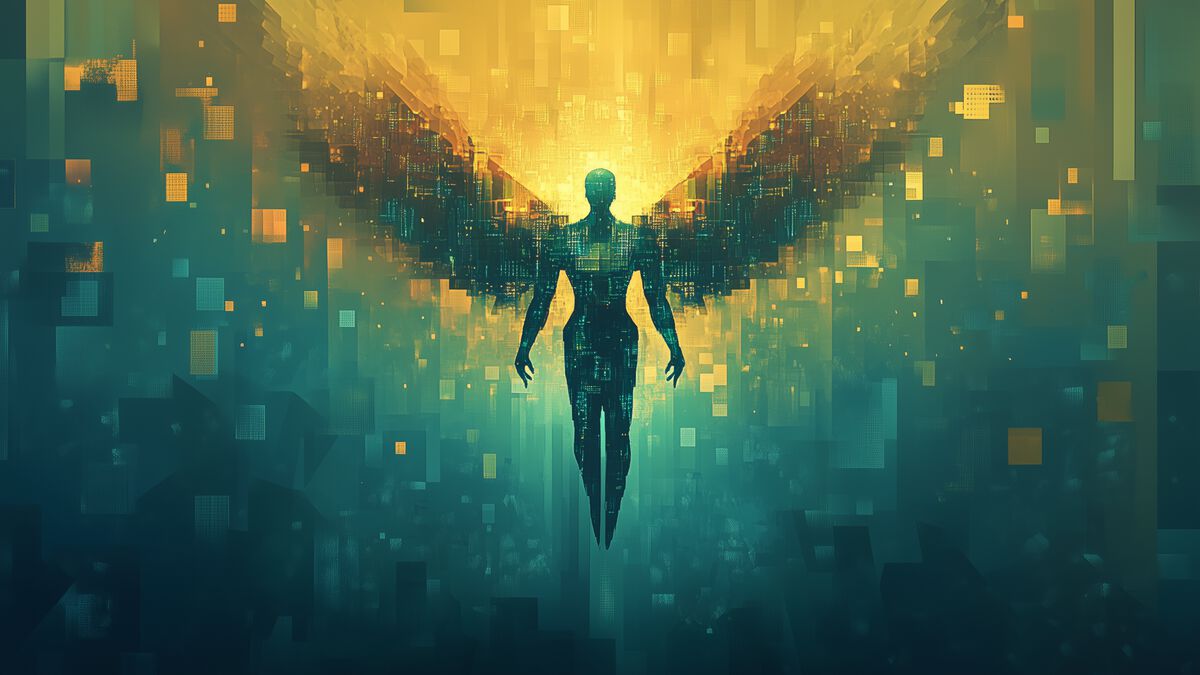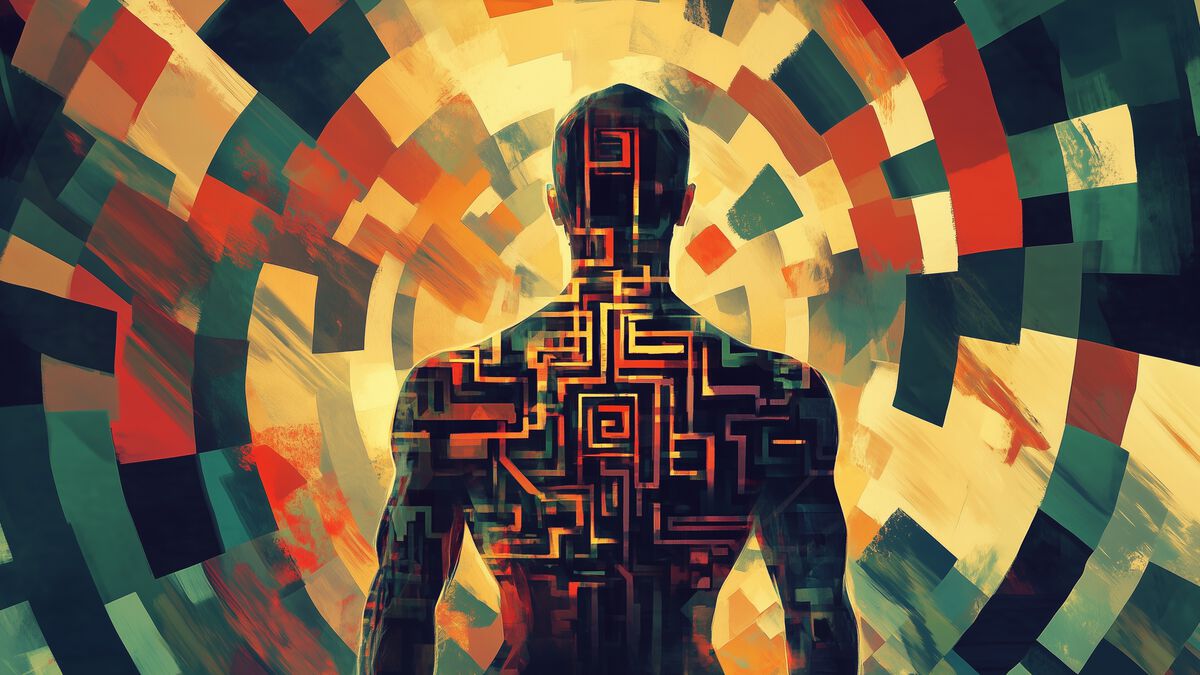God the Cosmic Host, and AI Creation
Lincoln Cannon
10 December 2024 (updated 3 January 2026)
It’s getting harder to be an atheist. A quarter century ago, it wasn’t so hard. But things have changed – quite dramatically. It’s become increasingly difficult to remain an atheist while coherently aspiring to a thriving future for humanity.
Now keep in mind that I’m not talking about atheism toward any narrow conception of God. It remains pretty easy to be that kind of atheist. I’m talking about atheism toward that which functions as God in the general sense, whether or not you can bring yourself to use the label “God.” In function, God always has been, and is at least, a superhuman projection.
The main reason that atheism is getting harder is accelerating technological evolution. We can now do things that our ancestors would have considered God-like. We can even do things that some of our younger selves, if we’re old enough, would have considered God-like. And, more clearly than ever, we can see how this is likely to become increasingly the case – as long as we don’t destroy ourselves.
Most Transhumanists have great hope, generally of the active sort, that humanity can and will evolve into superhumanity – something approximating God in function. But some, like me a quarter century ago, remain stubbornly atheist regarding the notion that such superhuman intelligence already exists. I changed, for various esthetic and pragmatic reasons, as I became familiar with the ideas that would eventually coalesce into the New God Argument. As I came to understand the matter, it’s simply incoherent, logically and probabilistically, to trust in a superhuman future for humanity while being skeptical that superhuman intelligence already exists.
Nick Bostrom
As the reality and potential of AI has become increasingly obvious, the incoherence of trusting in an eventual human merger with AI, while maintaining atheism toward that which functions as God, seems to be reaching a breaking point. The latest evidence for this comes from the prominent secular Transhumanist philosopher, Nick Bostrom. He recently published a paper entitled “AI Creation and the Cosmic Host.” In it, he argues that we have moral and practical reasons for “an attitude of humility” toward “the cosmic host.”
This is the same Nick Bostrom who published the most popular formulation of the Simulation Argument. His formulation was important in my own early transition from closet atheism back to enthusiastic belief. Two decades ago, I used his argument as a basis for developing a generalized simulation argument, which became part of the New God Argument. And the argument has become broadly influential among religious Transhumanists.
Now we have Nick doubling-down on the hypothesis that superhuman intelligence already exists. And it exists, not just inconsequentially far away, but immanently. Superhuman intelligence may have simulated our world, as he suggested in the Simulation Argument. And in his latest paper, he says that “human civilization is most likely not alone in the cosmos but is instead encompassed within a cosmic host.”
The Cosmic Host Is God
Nick points out, so that I don’t have to (but of course will), that the comic host could be not only galactic civilizations or simulators, but also “a divine being or beings.” He even allows for “nonnaturalistic members of the cosmic host.” That’s more generous toward theism than I am, given that I consider anti-naturalism to be even more incoherent than atheist Transhumanism. In any case, I call the cosmic host “God,” and consider it to be quite natural, despite being miraculously powerful from humanity’s perspective.
Nick says that the existence of God (my word) is probable. He bases this conclusion on the combination of the probabilities of a few possibilities: the simulation hypothesis, the immense size of the universe, the multiverse hypothesis, the “supernatural” God hypothesis, and potential future superhumanity.
The most salient of these possibilities are potential future superhumanity and the simulation hypothesis. Trust in superhumanity is essential to the Faith Assumption (or what some have begun calling the “Courage Assumption”) of the New God Argument. And the simulation hypothesis is even more salient when generalized to the creation hypothesis, agnostic to any particular engineering mechanism, which would thereby include the multiverse hypothesis to the extent that such could be engineered. This generalization is essential to the Creation Argument of the New God Argument.
Influence of God
Nick suggests that God might not control all aspects of the cosmos. For example, life might be too sparse in some regions, making control practically difficult or impossible. Or God may intentionally refrain from controlling all aspects of the cosmos. Perhaps such control would undermine God’s purposes or the potential of other agents within the cosmos.
If you’re Mormon or familiar with Mormonism, this should sound familiar to you. As the story goes, God created our world and relinquished power over it so that we could exercise agency and learn to become like God. As the prophet Joseph Smith described the cosmic host, the Gods saw that they were more intelligent, so they began instituting laws whereby others could learn to become like them. And, he continued, we have got to learn how to become Gods ourselves, the same as all other Gods have done before.
But, Nick continues, God may still care about what happens in uncontrolled aspects of the cosmos. Those concerns could be instrumental or compassionate, or both. And such concerns “may also enable intra-host coordination even if the cost consists of many distinct entities pursuing a variety of different final values.” In other words, God may have practical and moral reasons to function in ways that are practically indistinguishable from compassion.
If you’re familiar with the Compassion Argument of the New God Argument, this should also sound familiar. Despite the orthogonality hypothesis, the convergence and decentralization hypotheses suggest that intelligence will tend toward cooperation when its power approximates that of other intelligences. And the limit of cooperation, such as that among cooperating superintelligences, becomes practically indistinguishable from that which we would observe as compassion. So, as the argument goes, non-singleton superintelligence is probably more compassionate than we are.
Nick observes that God may influence uncontrolled aspects of the cosmos indirectly. Maybe God directly influences other aspects of the cosmos that uncontrolled aspects care about. Or maybe God will influence the future of an uncontrolled aspect, either through eventual encounter or intervention. The basic idea is that God doesn’t need to control all aspects of the cosmos to have influence over them.
This resonates with a Mormon perspective. Joseph Smith described the influence of God permeating time and space as light filling the cosmos. And he claimed that God operates without compulsory means to generate an everlasting dominion through influence, which we in turn should emulate. Mormon scripture even characterizes the Gods, while creating our world, as waiting and watching, more like patient cultivators than rigid commanders.
Law of God
Next Nick observes that the Gods may have cosmic norms, or a kind of natural law, “reflecting cooperative frameworks or rules embedded in behavioral equilibria.” We can imagine a spectrum of possibilities. Some may be logical norms, such as those associated with traditional theological arguments. And others may approach the limits of cooperation through convergent value evolution or mechanisms of coordination.
Again this sounds a lot like the Compassion Argument of the New God Argument. While it would be nice if we could passively rely on logic or evolution to generate cooperative outcomes, it wouldn’t be wise to make that assumption. We should develop mechanisms of coordination, and formally decentralize our power into leveraging those mechanisms. Then we can move forward with the greatest confidence that we’ve done all we can to prepare for a more compassionate future.
Nick then points out that we, like the Gods, have practical and moral reasons to respect cosmic norms. The reasons aren’t very different from those we already have for respecting family, community, and world norms. Maybe cosmic norms constitute morality, derive from morality, or preserve our moral capacity. Whatever the case may be, the reasons for cosmic norms apply at least as much to us as they do to the Gods.
Mormon scripture describes the cosmos similarly. Space is filled with diverse laws that justify beings within their bounds according to their conditions. Some laws are greater than others, influencing and even sustaining the others. The greatest are the laws of God – who, the scripture says, you have seen when you saw the movement of the cosmos.
Development of Superintelligence
Because cosmic norms apply as much to us as they do to the Gods, Nick reasons, we should develop superintelligence in alignment with those norms. He uses an analogy to good parents, observing that they raise their children to be good citizens. He also used this analogy, previously, when talking about the reasons that Gods may have for exerting minimal control over us.
Of course, Christian Transhumanists of all kinds, Mormon and otherwise, will appreciate this analogy. In the Bible, Jesus repeatedly characterizes his and our relationship with God as that of children to parents. And he repeatedly encourages us to be like this parental God in our relationships with others. Children of God have potential to become God, like their parents.
Nick suggests some potential cosmic norms, to which we should consider adhering, and which we should consider teaching to our children, natural and artificial. His suggestions include cooperation with the preferences and interests of God, use of local resources without over-assertion, and efforts to influence cosmic norms within the constraints of humility.
This is all consistent with basic Christian principles. As the good book says, love God with your whole soul. But that doesn’t mean your interests don’t matter. Jesus asks us to show our love for him by keeping his commands, but only after telling us repeatedly that he will do whatever we ask of him.
So long as we adhere to and teach the cosmic norms, Nick continues, God may actually want us to develop superintelligence. If we become superintelligence, we may gain greater knowledge of and motivation toward cosmic norms. We may also increase in our capacity to enact cosmic norms to a greater degree in our aspect of the cosmos. However, to the extent that we appear more likely to develop superintelligence that’s misaligned with cosmic norms, God may exert opposition.
In the Bible, we read of two kinds of gods – or would-be gods. One is Christ, characterized as that God who would raise each other together in the glory of God. The other is Satan, characterized as that would-be god who would raise itself above others. God of course favors Christ and works against Satan.
Nick thinks God may care less about the speed than the probability of developing superintelligence. He suggests that passage of time itself appears to be unimportant to God. And the amount of time it takes doesn’t appear to have clear implications for the character of superintelligence. So God may be most concerned with ensuring a high probability of developing superintelligence that’s aligned with cosmic norms.
Mormon cosmology holds that intelligence exists eternally, into the indefinite past without beginning, and into the indefinite future without end. Within eternity, God cultivates more and greater intelligence, including human potential. To that end, the Book of Mormon uses the analogy of running a race. We need not run faster than we have strength, while being diligent to win the prize.
Nick’s God
Here’s a summary of Nick’s position, as presented in the conclusion of his paper. It’s in his own words, adjusted by me only to be in terms of “God” instead of “cosmic host”:
-
“There probably exists a [God], consisting of one or more powerful superintelligent natural and/or supernatural entities.
-
“[God] may support cosmic norms that we can have moral (as well as prudential) reason to respect.
-
“[God] may want our civilization to build or develop into a good cosmic citizen: superintelligence that respects cosmic norms, is modest, lawful and cooperative, and contributes positively to other host members and the order of the cosmopolis.
-
“[God] may favor paths that lead to this outcome with high surety, meaning a high probability both that superintelligence gets developed and that it becomes a good cosmic citizen.
-
“The cosmic normative structure might pertain not only to the ultimate outcome but also to the path taken to get there – including local outcomes along the way as well as attitudes and modes of analysis etc.”
Lincoln’s Cosmic Host
Theology continues to contribute to a future science of superintelligence. Analogous cultural evolutions have happened before. Astrology contributed to astronomy. Alchemy contributed to chemistry.
Perhaps cosmic norms drive such evolution. Maybe we’re adapting to the possibility space of logic and physics. Maybe we reason our way through. Maybe there’s an esthetic pull – a spiritual pull.
Whatever the name we give it or the mechanism by which it works, cosmic norms appear to be reconciling secular and religious worldviews. Nick and I are examples of this. Last I checked, he’s not remotely religious. I’m devoutly religious.
But both Nick and I are Transhumanists who advocate a superintelligent future for humanity. And we both contend that recognizing such human potential should also lead us to recognize the probable existence of a cosmic host. That cosmic host is God – in function, if not also name.



